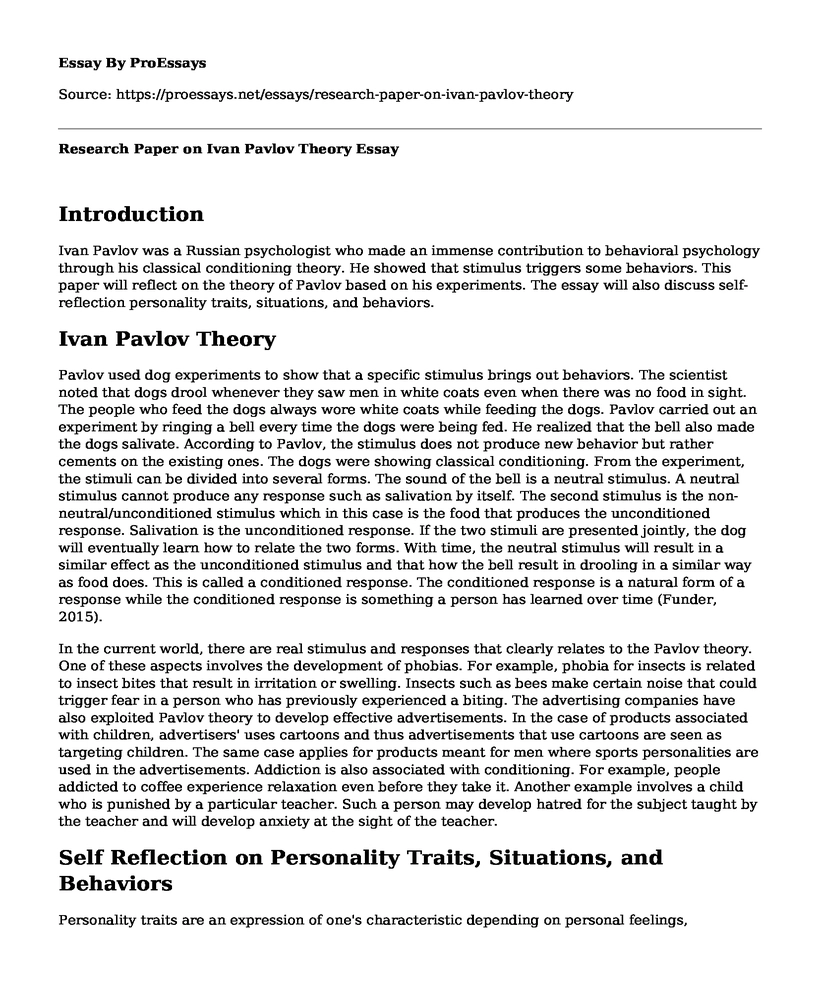Introduction
Ivan Pavlov was a Russian psychologist who made an immense contribution to behavioral psychology through his classical conditioning theory. He showed that stimulus triggers some behaviors. This paper will reflect on the theory of Pavlov based on his experiments. The essay will also discuss self-reflection personality traits, situations, and behaviors.
Ivan Pavlov Theory
Pavlov used dog experiments to show that a specific stimulus brings out behaviors. The scientist noted that dogs drool whenever they saw men in white coats even when there was no food in sight. The people who feed the dogs always wore white coats while feeding the dogs. Pavlov carried out an experiment by ringing a bell every time the dogs were being fed. He realized that the bell also made the dogs salivate. According to Pavlov, the stimulus does not produce new behavior but rather cements on the existing ones. The dogs were showing classical conditioning. From the experiment, the stimuli can be divided into several forms. The sound of the bell is a neutral stimulus. A neutral stimulus cannot produce any response such as salivation by itself. The second stimulus is the non-neutral/unconditioned stimulus which in this case is the food that produces the unconditioned response. Salivation is the unconditioned response. If the two stimuli are presented jointly, the dog will eventually learn how to relate the two forms. With time, the neutral stimulus will result in a similar effect as the unconditioned stimulus and that how the bell result in drooling in a similar way as food does. This is called a conditioned response. The conditioned response is a natural form of a response while the conditioned response is something a person has learned over time (Funder, 2015).
In the current world, there are real stimulus and responses that clearly relates to the Pavlov theory. One of these aspects involves the development of phobias. For example, phobia for insects is related to insect bites that result in irritation or swelling. Insects such as bees make certain noise that could trigger fear in a person who has previously experienced a biting. The advertising companies have also exploited Pavlov theory to develop effective advertisements. In the case of products associated with children, advertisers' uses cartoons and thus advertisements that use cartoons are seen as targeting children. The same case applies for products meant for men where sports personalities are used in the advertisements. Addiction is also associated with conditioning. For example, people addicted to coffee experience relaxation even before they take it. Another example involves a child who is punished by a particular teacher. Such a person may develop hatred for the subject taught by the teacher and will develop anxiety at the sight of the teacher.
Self Reflection on Personality Traits, Situations, and Behaviors
Personality traits are an expression of one's characteristic depending on personal feelings, mentality, and behaviors. Situations are usually spontaneous occurrences which have the capability of influencing someone to act in a specific manner. Personality traits are normally expressed from within a person and can be expressed throughout a person's life. Distinct people show varying personality traits that are heavily influenced by genetic factors and environment Situations have a major impact on behaviors (Funder, 2015).
In my life, I have identified several situational variables that influence my behavior. Some of my personality traits include empathy, ambitious and strong-willed. My upbringing could have played a role in these traits. Empathy refers to the urge to help others in need. This trait could have originated from the environment I grew in as a child. I grew around people who were empathetic and always wanted to help others and I believe I learned through observation. Genetic factors could have also played a part since these people were relatives. Some situations usually increase my tendency to be empathetic. Once I observed a needy person in some places such as in streets, I always get the urge to help them by any means possible. I am also ambitious to achieve my desired goals in life. As a result, I have always worked hard and developed appropriate behavior that will help in a successful life. I have developed an appropriate attitude towards successful people who I want to emulate. Some situations such as incentives or rewards have always acted as motivation towards attitude change. For example, each time I score a high score in any difficult test, my attitude towards the subject significantly changes to believing everything is possible in all areas of life. I am also strong-willed and willing to do anything possible to succeed even when other people think it is impossible. I have realized that when people discourage me in things that they believe I cannot achieve, I usually work towards proving them wrong and I am always consistent in trying.
Conclusion
Ivan Pavlov theory shows that stimulus can be used to bring out a specific behavior. This occurrence can also happen in human beings where distinct stimulus triggers specific behaviors. Personality traits, situations, and behaviors are usually involved in shaping the lives of people. Personality traits are unique in different people. Situations are known to influence behavior at a particular occurrence.
References
Funder, D.C. (2015). Personality Puzzle. New York: W. W. Norton & Company
Cite this page
Research Paper on Ivan Pavlov Theory. (2022, Nov 29). Retrieved from https://proessays.net/essays/research-paper-on-ivan-pavlov-theory
If you are the original author of this essay and no longer wish to have it published on the ProEssays website, please click below to request its removal:
- Essay Example on White-Collar Crime and Deviance
- Counselor for Children Undergoing Through Stress Related Issues Job Interview
- Essay Sample on Skills in Prioritizing and Management of Time and Stress
- Paper Example on My Nature Escapades: Exploring Waterfalls for Stress Relief
- Aging: Homeostenosis & Sleep Disorders - Essay Sample
- Essay Example on Anxiety Diagnosis: Features & History to Elicit
- Overcoming Adversity: How Challenges Shape Character - Essay Sample







